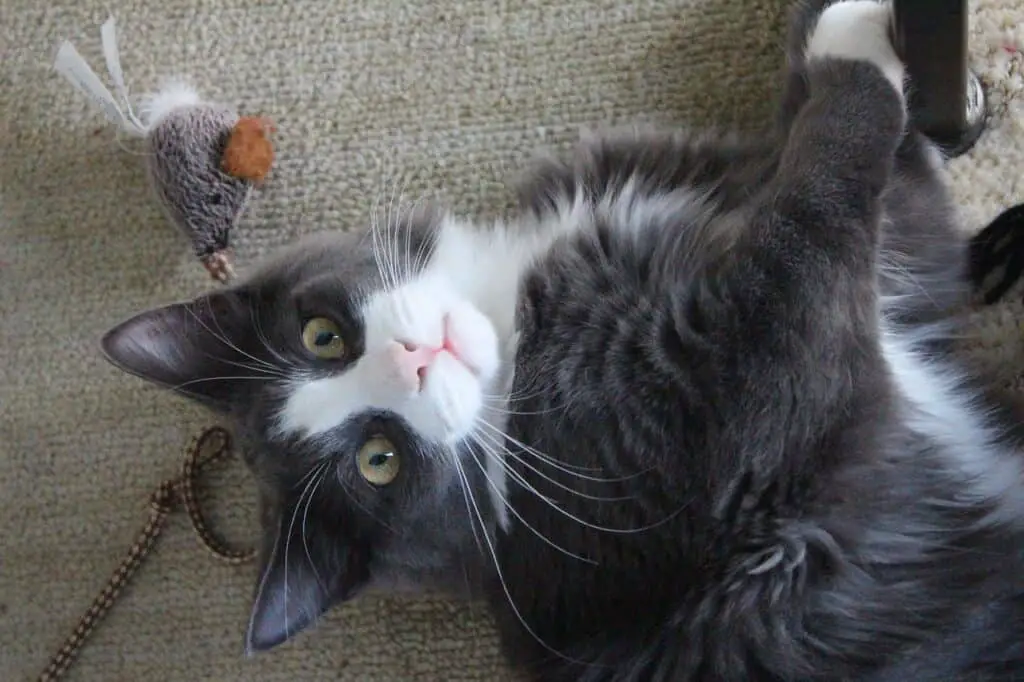I’m sure my cats listen to me when I talk to them, especially when I call their names. When I mention this to others, I often get stares of disbelief. They tell me cats just respond to anyone, hoping to get a treat or petting.
There is much debate on this topic, and different studies suggest the following;
Cats can understand about 25-35 words, but rather than interpreting the words themselves, it is their association with your tone of voice, body language, and actions from which cats derive the meaning of what you’re trying to say.
What words can cats understand?
Cat owners often wonder what words their cat understands and how they can teach them our language. Even if it’s only a few words, can cats really learn to understand what we’re saying?
Cats are not very vocal animals; they generally only use ‘meows’ to get our attention but do not communicate with their other cats. For this reason, it’s much harder for cats to learn and understand our language than for vocally oriented dogs.
That said, cats can learn the meaning of some words by association. This means you can teach them the meaning of words over time by speaking them while performing a specific action or showing them what it means.
For example, cats could memorize words like ‘eat’ or ‘food’ when used in conjunction with feeding time. Over time, they will start to recognize those words and anticipate food or a treat.
On the other hand, the word ‘no’, when pronounced with a stern voice and when your cat does something wrong, will make them understand that you don’t approve of something.
Often using sweet words like ‘good boy’ or ‘sweetie’ while petting your cat will make them associate these words with love and affection.
From this, we can conclude that it’s not so much the words that cats interpret but the context and how they are used.
How do cats respond to your voice?
Since vocal communication, in general, doesn’t play an essential role in communication between cats, they don’t respond to words in the way humans do.
Imagine not responding when a family member is speaking to you. You would perceive this as very rude or uninterested. On the other hand, cats have never learned that they need to respond when spoken to.
Instead, they might choose not to respond or acknowledge you with a non-verbal response like turning their ears towards you, making eye contact, or twitching their tail.
How cats respond to us when we speak to them depends on your cat’s mood and, believe it or not, whether there is something in it for them, such as a treat or a petting session.
Some cats are more social than others, though. For example, it is known that Siamese cats are very vocal and chatty and like being talked to.

Do cats listen to their name?
According to the researchers led by Atsuko Saito, cats generally respond very well to calling them by name. Their research shows that cats are more likely to respond to their name than other words.
Noteworthy was that the research also showed that cohabiting cats responded to their housemates’ names.
On the other hand, there was a much lower response when the researchers spoke words other than their names.
This could prove that cats can learn to understand the content of spoken human words by listening to sounds and intonation. They can distinguish their name from a random set of words, even if called by someone other than their owner.
It remains unclear whether cats understand their name for what it is or that it’s more like the same meaning as “hey, attention” to them.
Do cats understand what we say to them?
There is no hard scientific proof that cats understand the true meaning of our words. They can learn and respond to certain words, but the consensus is that this is based on association rather than the word’s actual meaning.
If you would tell your cat, “I love you” in a loud and stern voice, they will not understand these words’ meaning. On the other hand, when you say this in a soothing voice while petting them, they will positively associate with it.
So, tone of voice is essential but non-verbal language is just as important, and when it comes to cats understanding what we mean, they go hand in hand. For example, saying sweet words to your cat while staring them in the eyes will not lead to a positive response from your cat.
Staring is threatening behavior in the cat world, especially if combined with vocals (like cats stare and growl at each other during a fight). Doing this might result in your cat hitting you instead.
Cat cats learn and obey commands like dogs?
Although some cats can act like dogs (see why cats would do such a thing in my article here), it is unlikely that you will get a cat to obey vocal commands as a dog would.
Dogs pay a lot of attention to everything we say, whether or not we’re addressing them. This results from centuries of human dog breeding and teaching them to be helpful to us.
It is in the dog’s nature to please their human owners; as such, they are keen to understand what their “master” wants and listen to us carefully.
With cats, this is not the case at all.
Humans domesticated dogs to make life easier for us. With cats, it is the other way around. Cats chose to live with humans because it made life easier for them.
For this reason, a cat will not learn tricks or respond to commands to please a human being. Cats see themselves as pack leaders, while dogs are happy to submit to their owners.
Cats can learn to perform tasks, but they will always ask themselves, “what’s in it for me?”. If they decide it’s fun or valuable, they will go along with it as long as they feel they’re in control.
How should you communicate with your cat?
Now that we know that cats are not really into verbal communication, you might ask yourself, “what is the best way to communicate with my cat”?
Never call your cat’s name when you’re angry
Because cats associate words with events (when I hear this word, this thing happens), you must never call your cat’s name when disciplining them.
Cats are susceptible to loud sounds and negative emotions. Calling out their name angrily when they did something wrong is entirely understandable, but this might cause your cat to associate their name with negativity.
You don’t want your cat to be scared of you when you call them. Their name should have a positive meaning in their mind.
Train your cat to associate words
Over time, being consistent in using certain words for specific occasions will train your cat’s understanding of those words.
This can be used for positive and encouraging things and to teach your cat that they better not engage in specific actions. For the latter, training your cat on the meaning of the word ‘no’ can be beneficial.
Does your cat understand your meowing?
Some cat parents might be tempted to turn the tables and try to communicate with our cats in their language.
You could try to meow at your cat, but it won’t be very effective apart from the fact that your cat will look at you like you’re crazy.
Your meows might mean something, but it’s unlikely that your cat will understand you.
Some cats might even find it amusing and meow back at you. It’s an excellent game, but you should observe your cat and stop meowing at them if they act scared or confused.
Do cats like being spoken to?
Whether cats like being talked to depends on your cat, their personality, and even their mood at that moment.
Some cats might enjoy the interaction with you and spend time with you. This is especially true since they know that getting attention from their owners is usually a good thing. Who knows? They might get a treat, kisses, or tickles.
Bottom-line is that any positive interaction between you and your cat is something they enjoy, whether this includes talking or not. That being said, in case you like singing and often serenade your cat, here’s a reason why your cat might hate you for that.
Apart from that, we don’t know any cats that dislike their owners talking to them, so feel free to share your daily stories with your cat and enjoy your conversations.




